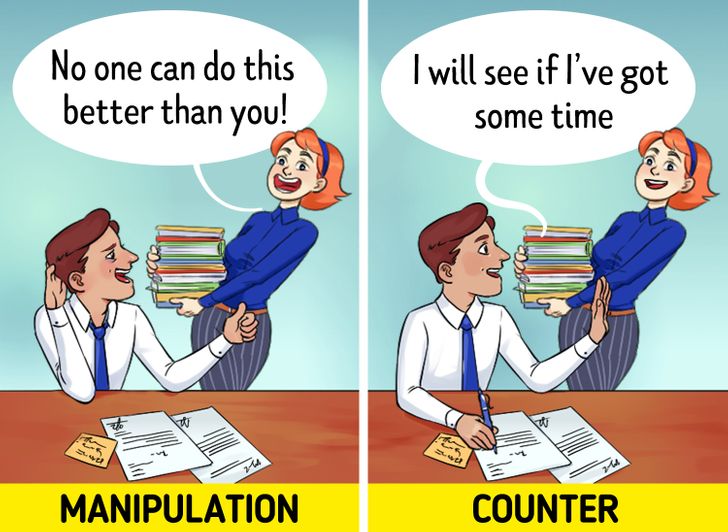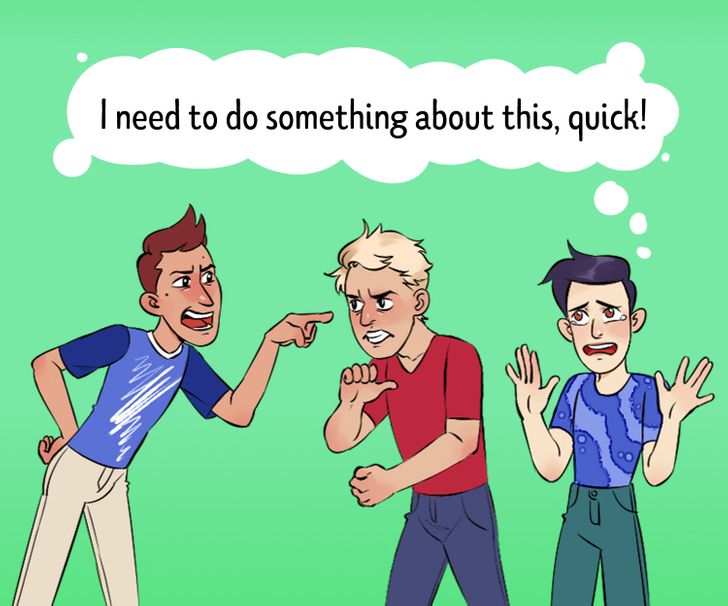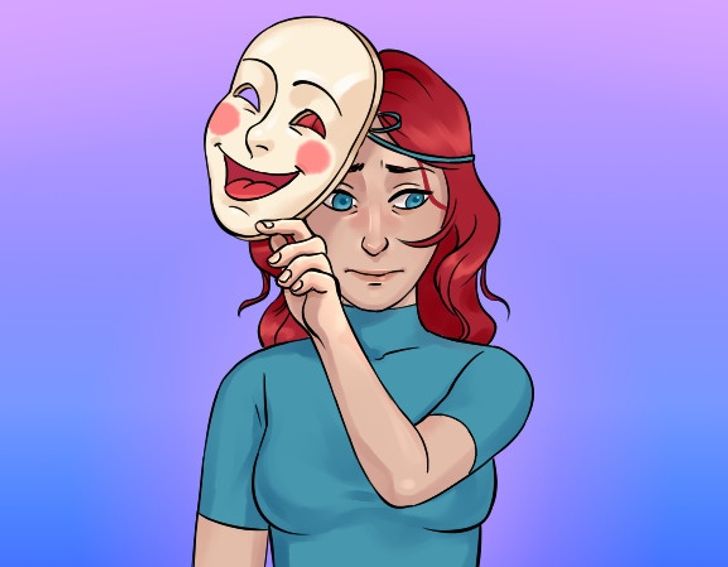Thanks 4 the advice!!!
10 Signs You Try to Please Others Too Much, and How to Stop Doing This

Making others happy and striving for positivity in your social life is always good, but only to a certain point. If you try too hard, it can turn into an unpleasant and even destructive habit — people-pleasing. At one moment, you might find yourself putting your own needs aside, forgetting about your personal time, and bringing stress on yourself, just to make sure the people around you feel good.
Bright Side highly values the mental health of our readers. This time we can’t wait to discuss this delicate topic with you and come up with solutions that can help everyone appreciate themselves more.
1. You find it hard to say no.

You always help others, organize things for them, or simply do them a favor. The reason is simple: you can’t say “no” to their requests. You might be scared that if you refuse, they might get angry or think that you don’t care about them. Moreover, saying “no” gives you an unpleasant feeling of guilt. To avoid that, you tend to accept everything, and even let people violate your free time this way.
Solution: Realize the power of saying “no.” It can be hard at first, but in the end, it will pay off. Refusing something that constantly takes your free time doesn’t make you selfish. Instead, you are treating yourself with love and respect.
2. You want everyone around you to like you.

Fear of rejection is another trait that is rather common when it comes to people-pleasers. You are scared that if people don’t like you, they will leave you alone. As a result, you try to do everything to prevent these things from happening by changing your behavior to benefit others, and people around you could notice this and actually use you.
Solution: Check to see if you are being manipulated: if others know you would do anything for them, most of them won’t hesitate to use this as an opportunity. They can use sweet requests like, “But you are the only one who can do it,” pushing you to do things for them. As soon as you see something like this, it’s better to put yourself and your personal time as a top priority.
3. Other’s negative emotions influence you.

There is nothing wrong with avoiding a conflict and turning things into an innocent joke. But those who tend to want to please others, can’t handle any discontent, even if it’s not about them. People pleasers can see the negative emotions of people around them as a sign that others are unhappy with them too. To change the situation, people pleasers will take the blame and come up with solutions that will make others happy.
Solution: Understand that conflicts are unavoidable and can be beneficial. It allows people to express themselves and speak about the many things that bother them. Suppressing your feelings and those of others is unhealthy, because we all need to just blow off steam sometimes.
4. You feel guilty and apologize for everything, even when it’s not necessary.

If any situation does not go as planned, your first reaction is “I’m sorry!”. No matter what happens, you always try to take the blame and bear the consequences. This comes from an inner desire to be nice and polite, but in the end, it only damages your self-esteem more and can turn into a habit.
Solution: Pay attention to what you do, say, and feel: try to analyze why and when you start to apologize. Also notice the people who you do this with. In many situations, extra explanations and blame are not necessary, so you can easily let yourself skip this.
5. You put your own needs and desires aside.

Because you are too busy thinking about others’ feelings, you often forget to think about your own. You have this ability to put your emotions aside and forget about what you really want at the moment. In one moment, you might not even know yourself very well anymore. It can even get to the point where it feels hard for you to speak about your feelings and choose what’s best for you.
Solution: Listen to yourself more: take some time where you learn what you like and what you want. You can write down a list of your own priorities and the things that make you happy.
6. You prefer giving rather than receiving, even if it costs you your own comfort.

Everyday sacrifices for others’ sake can become a norm for those who constantly try to please people. For example, you get stuck in a toxic relationship, where you give more than you receive. You might hope that others will notice and appreciate it, but usually, people tend to get used to your convenient approach to them, and in the end, you get nothing left for yourself.
Solution: Think about your priorities: decide what is important for you first, not for others, You can also set a specific time limit, when you are fully available to help others. For example, on Tuesday and Thursday evenings. This way you will make sure you have some time for your own activities and hobbies.
7. You feel responsible for how other people feel.

You seem to notice every emotion and mood change of your friends and family, and this always makes you worry. During tense moments, you might even blame yourself for not being able to calm someone down and make them happy. The truth is, it’s the responsibility of each individual to take control over their own emotions.
Solution: Use empathic assertion: you can try to understand how others feel and what they want, but you follow it with a strong statement. For example: “I realize where your anger is coming from, but all I can do is to be by your side now.”
8. You try to match the people around you.

People-pleasers can get scared of showing their real personalities to others. Instead, they decide to go with the flow and change themselves to behave just like others do. This way they might think that the people around will like them more and that the atmosphere around will become more comfortable.
Solution: Learn to be yourself around others: even though you might have a lot of similarities with the people around you, try to recognize and respect your differences with them. You as an individual, with your own interests and opinions, are just as nice to be around. There are so many things that make you unique, and you don’t need to hide them.
9. You want others to praise you.

People-pleasers will always seek praise from others. Most of the time, it comes from a rather low self-esteem. Approval makes you feel liked, needed, and worthy. In your eyes, it might seem like others care a lot about you and appreciate you, and this finally makes you feel good about yourself.
Solution: It’s time to stop seeking validation: try to check what you are doing to receive praise from others. This can be posting a lot on social media, or constantly contacting your family to talk about your latest achievements. Once you find it, you can gradually start breaking this behavior.
10. You don’t admit when your feelings are hurt.

Because you always try to make others happy, you also put a big strain on yourself. You try to hide your negative feelings so that others won’t get disturbed by them. You deny that you feel sad, angry, or disappointed by something, and put on a happy mask. This can lead to a situation where you don’t understand how you feel anymore.
Solution: Learn to acknowledge your feelings: suppressing your emotions can put a lot of stress on your body and lead to unhealthy consequences. Self-care is just as important as care about others. Be compassionate with yourself, and try to treat yourself and your feelings with attention and love.
Do you value the feelings of others more than your own? Let’s discuss this in the comment section!
Comments
Oh this has "ME" written all over it, I can't say no to anyone and the worst part is that I am fully aware of it
This article is so true and strongly sad for people who do whatever it takes to please others even though it's a selfless move.
Related Reads
I Gave My Grandkids Their Inheritance at 18 — Their Stepmom Says I Destroyed Her Blended Family

10 Moments of Superhuman Strength That Feel Like Winning the Olympic Games

I Refused to Watch My DIL Give Birth— She Made Sure I Regretted That Moment

15 Stories That Prove Some Memories Are Impossible to Delete

12 Moments That Prove Kindness Can Soften the World’s Hardest Edges

I Refused to Follow My Boss’s Dress Code—HR Had to Step In

15 Heart-Centered Moments of Human Kindness That Only Happen Once in a Blue Moon

My Parents Refused to Fund My Education, So I Turned the Tables on Them

I Refuse to Earn Pennies While My Manager Cashes a Fortune

I Refuse to Give Up the Passenger Seat for My MIL—She Should Learn Her Place

10 Hospital Workers Who Prove Kind Heart Is a Powerful Medicine

14 Powerful Kindness Stories That Restored Hope in Tough Times
